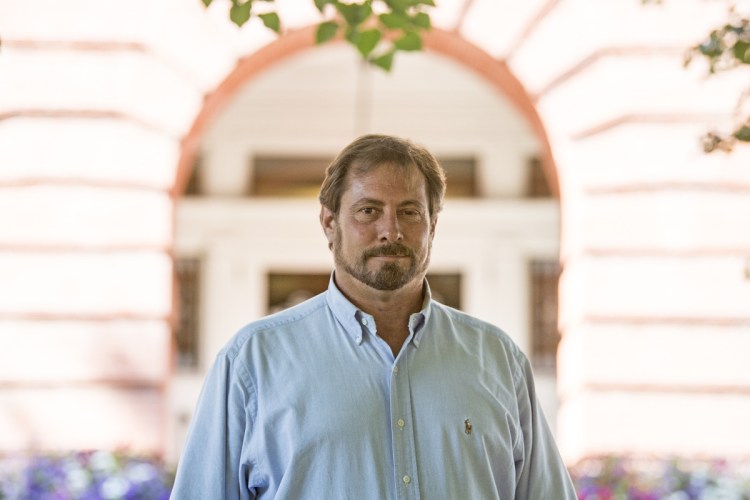WATERVILLE — Nearly two months after he was declared the winner of his primary election in June, Mark Andre, the Republican nominee for the Maine House District 110 seat, finally has heard he will receive the Clean Election funding he qualified for.
Andre was one of nearly 130 candidates who qualified for the funding but did not receive it. On Wednesday he said he should finally receive that $5,075 check in two days.
Now Andre said he will be able to fund his initial mailer aimed at getting Colby College and Thomas College to contribute toward lowering the city’s tax rate and launch his campaign website. The mailer urges the receiver to sign a petition asking Colby to contribute money to the city to lower property taxes in Waterville. Once he has 800 signatures on his petition, he will deliver the signatures to the City Council and ask councilors to formalize a request to Colby.
“The initial response has been very good,” Andre said.
Andre’s funding was withheld because of a late recount, which was called by his primary opponent, Jacob Imes; but Andre ultimately was declared the winner by a vote of 210-203. However, the recount occurred right up at the end of June, and it wasn’t certified until early July, after the new fiscal year began. The state’s Ethics Commission said it did not have the authority to release the Clean Election money, because of a typographical error that eliminated funding.
However, on Tuesday, the administration of Gov. Paul LePage announced the release of $1.4 million in Clean Election funding that had been withheld. A judge had ordered the LePage administration to release the funding, but the ruling had been expected to be appealed to the state’s Supreme Court.
Payments to candidates now have been processed, according to a Portland Press Herald report, and they should be receiving their money within the next few days. Seven Clean Election candidates, including independent gubernatorial candidate Terry Hayes, and the Maine Citizens for Clean Elections sued LePage in June because he refused to release the funds, which came from money not spent in the 2016 election cycle.
Andre had contended he should have been issued a check, as he claimed he was the presumptive nominee in his primary race, and though the Ethics Commission did try to find ways to issue him a check — including writing one to him and Imes in the event either won the recount — is was not allowed to issue the check.
“What happened to my campaign should never happen to another Clean Election candidate,” Andre said.
Andre contends that withholding the funding left him at a disadvantage, as his Democratic opponent in November, Colleen Madigan, is also a Clean Election candidate, already had received the funding and could be campaigning.
Andre, whose case is peculiar because his funding was denied because of the late date of a recount, is one of about 130 candidates who are missing the funding they qualified for, because LePage refused to release $1.4 million in public funding for Clean Election candidates; and Republican House members have refused to fix a typographical error in the law that provides additional Clean Election funds to be disbursed this year.
Andre maintains hope that his strange case was just a staff error, as this kind of problem never had come up before. He blamed the implementation of ranked-choice voting
Another Republican House candidate, Kathy Javner, running for the House District 141 seat representing parts of Penobscot and Washington counties, did not receive her $5,075. The ethics office made a mistake in not issuing her a check, as they assumed the close race eventually would lead to a recount.
A majority of the other candidates missing funding were Democrats or unenrolled, and the rest, other than Andre and Javner, were missing supplemental funding.
The Clean Election Act, established in 1996, is a voluntary program that fully finances qualified individuals running for governor or the Legislature. To qualify, candidates must collect a minimum number of donations of $5 or more made payable to the Maine Clean Election Fund. Once the candidate qualifies, he or she cannot accept private contributions.
Andre said he plans to meet with the Ethics Commission again at some point to make sure the circumstances that befell him don’t happen to candidates in the future, and that funding should be set aside for candidates regardless of the request for a recount.
“What we’re dealing with is a flawed staff policy that never came up because of unique circumstances,” Andre said.
In an emailed news release, the Maine Citizens for Clean Elections campaign said despite “some initial foot-dragging, the administration now appears willing to help the Ethics Commission distribute funds on an expedited basis today.”
“We are satisfied that defendants are on a path to full compliance with the law, to conclude this episode of unnecessary delay and obstruction. The candidates and the voters can be assured that this important democracy initiative will continue to be in effect through the 2018 election cycle,” said John Brautigam, attorney for MCCE.
Colin Ellis — 861-9253
cellis@centralmaine.com
Twitter: @colinoellis
Send questions/comments to the editors.




Success. Please wait for the page to reload. If the page does not reload within 5 seconds, please refresh the page.
Enter your email and password to access comments.
Hi, to comment on stories you must . This profile is in addition to your subscription and website login.
Already have a commenting profile? .
Invalid username/password.
Please check your email to confirm and complete your registration.
Only subscribers are eligible to post comments. Please subscribe or login first for digital access. Here’s why.
Use the form below to reset your password. When you've submitted your account email, we will send an email with a reset code.